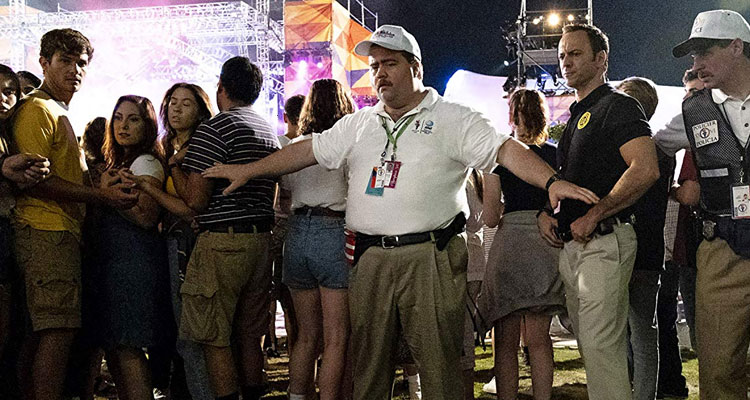Richard Jewell (USA / TBC / 131 mins)
In short: Needs more polish
Directed by Clint Eastwood. Starring Paul Walter Hauser, Sam Rockwell, Jon Hamm, Olivia Wilde, Kathy Bates.
The Plot: Atlanta, July 1996. Richard (Paul Walter Hauser) is working as a security guard at a concert being held in Centennial Park to celebrate the Olympics. He has a keen eye for detail and knows when something isn’t right. That’s what happens when a bag shows up unattended, so he alerts the police. It contains two pipe bombs and blows up during the evacuation, killing two and injuring over a hundred. Richard is initially hailed as an American hero who saved many lives, but that turns sour when journalist Kathy (Olivia Wilde) leaks a story from FBI Agent Shaw (Jon Hamm) that Richard is the prime suspect. He maintains his innocence but his behaviour, past and present, fits the FBI profile of a false hero. Richard enlists the help of lawyer Watson (Sam Rockwell) to start the long battle to clear his name…
The Verdict: Clint Eastwood has a thing for real-life all-American heroes. Hard-working, talented, salt-of-the-earth men just doing their jobs on a daily basis and expecting nothing but personal satisfaction in return. They don’t crave heroism or fame, but find themselves committing a heroic act which comes to define their place in the world. So it was with American Sniper, Sully: Miracle On The Hudson and The 15:17 To Paris. Eastwood’s latest film Richard Jewell follows in that same vein and relates the story of a man, who a lot like Captain Chesley Sullenberger, found the media glare turned inward as America begins to question what its heroes need to be made of. It seems that it’s not enough to be found a hero in America. Validation and verification is also required by the investigative authorities and the public.
The screenplay, adapted by Billy Ray (who has previous form in adapting true stories) from a magazine article by Marie Brenner, is structured a lot like its straightforward, unassuming hero. It’s told from Richard’s perspective, taking his side early on and runs all the way with it through the media firestorm that follows. While that’s admirable on Ray and Eastwood’s part in portraying a flawed but basically decent man trying to do the right thing, it does drain the film of some dramatic tension. What if the audience didn’t see what happened and wasn’t sure about Richard, keeping us on our toes about his motivations? His overly curious nature about people, his utter commitment to his job and awkward habit of talking when he should stay quiet is ammunition for others to use against him. This could have made for more meaty subject matter for Eastwood to dig into.
Instead, Eastwood’s delivery is basic and doesn’t quite elevate the material as high as he did with his other American heroes. At least it’s a good deal better than the misguided misfire that was The 15:17 To Paris. The portrayal of the FBI as manipulative snakes and the press as pushy and quick to judge is two-dimensional direction from Eastwood – which has generated its own offscreen controversy regarding the late Kathy Scruggs. Judge as you may, but the film does come with the standard disclaimer in the end credits about narrative licence. Better is the warm depiction of Richard and his relationship with his concerned mother Bobi (Kathy Bates), who gives an impassioned speech in defence of her son later in the film. There’s also good rapport between I, Tonya actor Hauser (good in the lead role) and Rockwell’s amiable but forthright lawyer who stands by his man no matter what.
The original Vanity Fair article was entitled American Nightmare: The Ballad Of Richard Jewell. In a sense, Eastwood’s film is a nightmarish dissection of how America responds to acts of selfless heroism. However, America can turn against its heroes almost as quickly as it claims them when facts emerge which don’t portray these heroes as squeaky clean as Clark Kent / Superman. It’s a jewel of a story, but it doesn’t shine as brightly as it should. It works fine for what it is and is agreeable enough, but needed a bit more polish to buff it up. One can only imagine what original director Paul Greengrass might have done with it instead.
Rating: 3 / 5
Review by Gareth O’Connor


